Military Veterans Could Ease N.C. Labor Shortage

By Dan Barkin, Business North Carolina, May 15, 2023
More than 21,600 active-duty personnel at North Carolina bases are projected to leave the military this year. Over a four-year period, beginning in 2022, the total is expected to be nearly 75,000.
This was in a presentation by Joshua Levy, a senior policy analyst at the N.C. Department of Commerce. He was presenting last week at a follow-up meeting to February’s Emerging Issues Forum to continue a task force discussion about veterans and the workforce.
At a time when companies are struggling to hire, there’s a lot of interest in veterans who are transitioning to civilian life. North Carolina has one of the largest concentrations of military in the nation, more than 101,000 active-duty personnel at places such as Fort Bragg in Fayetteville, Camp Lejeune in Jacksonville, Marine Corps Air Station Cherry Point in Havelock, Seymour Johnson Air Force Base in Goldsboro, and the Coast Guard base in Elizabeth City. The importance of veterans to our workforce was part of a larger report on the military’s economic impact on North Carolina that Levy and other N.C. Commerce staff prepared last fall for the N.C. Military Affairs Commission and the N.C. Department of Military and Veterans Affairs, in conjunction with the consulting firm Regional Economic Models.
One point Levy made is that not all of those separating veterans will be staying in North Carolina. A lot of them are from California, Florida and Texas and other states and will be headed back home. But the same is probably true of North Carolina natives who are based now in California, Florida and Texas. Many will come back here.
Interestingly, a Fayetteville State survey of military personnel, mostly from Fort Bragg, said that 40% planned to stay in North Carolina, Levy said.
Some 44% of the survey respondents said they planned to work full time when they got out, and another 36% planned to enroll in college full time. Their top desired job areas were logistics/operational management; maintenance and repair; information technology; and government administration.
Levy cited a Pew study of post-9/11 veterans that showed that 42% of respondents said that they were overqualified for their first post-military job, based on their experience and training.
“That’s another issue to kind of be aware of,” says Levy.
There are many nonprofits focused on helping transitioning veterans and military spouses get jobs and educational opportunities. There is a list of links on the state web site of organizations like North Carolina for Military Employment (NC4ME), a public-private partnership. Helping veterans – and encouraging them to settle here – is a major focus of the military affairs commission and the military and veterans affairs department.
One of the task force recommendations was to create a comprehensive online portal to services for veterans.
The leader of the task force, Mike Mullins, a retired Army lieutenant colonel, talked about the “sea of goodwill” facing transitioning service members.
“Veterans have so many different organizations and options to consider. And many of these veterans, keep in mind, have never even had civilian employment. Think about it. Four or five years in the military, or maybe somebody who went into the Army as a lieutenant and they get out as a captain or even as a lieutenant colonel, and they’ve never had civilian employment in their lives.
“So it can be really overwhelming. Think about the hundreds, if not thousands, of organizations that exist in the United States that help veterans and family members, not only with employment but with a variety of other challenges that they face. It can be a daunting task to navigate through these difficult waters and determine what is the most beneficial source to go to and resources to use for them,” says Mullins, director, defense industry initiatives for N.C. State’s Industry Expansion Solutions service.
One of the task force members, Erin Ananian-Gentile, says many female service members who separate from the military are subsequently unemployed or under-employed, and “a lot of their worries have to do with child care.” There is also some confusion among employers about veterans’ disability levels.
“Even if someone comes out of the military with a total and complete disability of 100%, that doesn’t mean they can’t perform a job as good as anyone else. It’s just the way the military rates them,” says Ananian-Gentile, who works for the North Carolina Military Business Center in New Bern.
Another task force member, Tyler Klemas, one of 2,000 veterans who work at Duke Energy, says one barrier to recruiting veterans is how job descriptions are advertised, particularly by the largest companies.
“If you look at a job, and you’re a transitioning veteran, and you see the position and it’s ‘You must have a degree in this, and you must have this, and you must have this.’ And there’s so much red tape and rules and regulations and the experience and stuff like that that the veteran needs to have. Whereas, when it’s a smaller business owned by a mom and pop or somebody who has a construction company or something like that, they can actually bring that veteran in. . . and say, ‘OK, they may have to learn a couple things here and there but they’re a good person, probably be a good employee, a good leader.’”
 Previous
Previous


